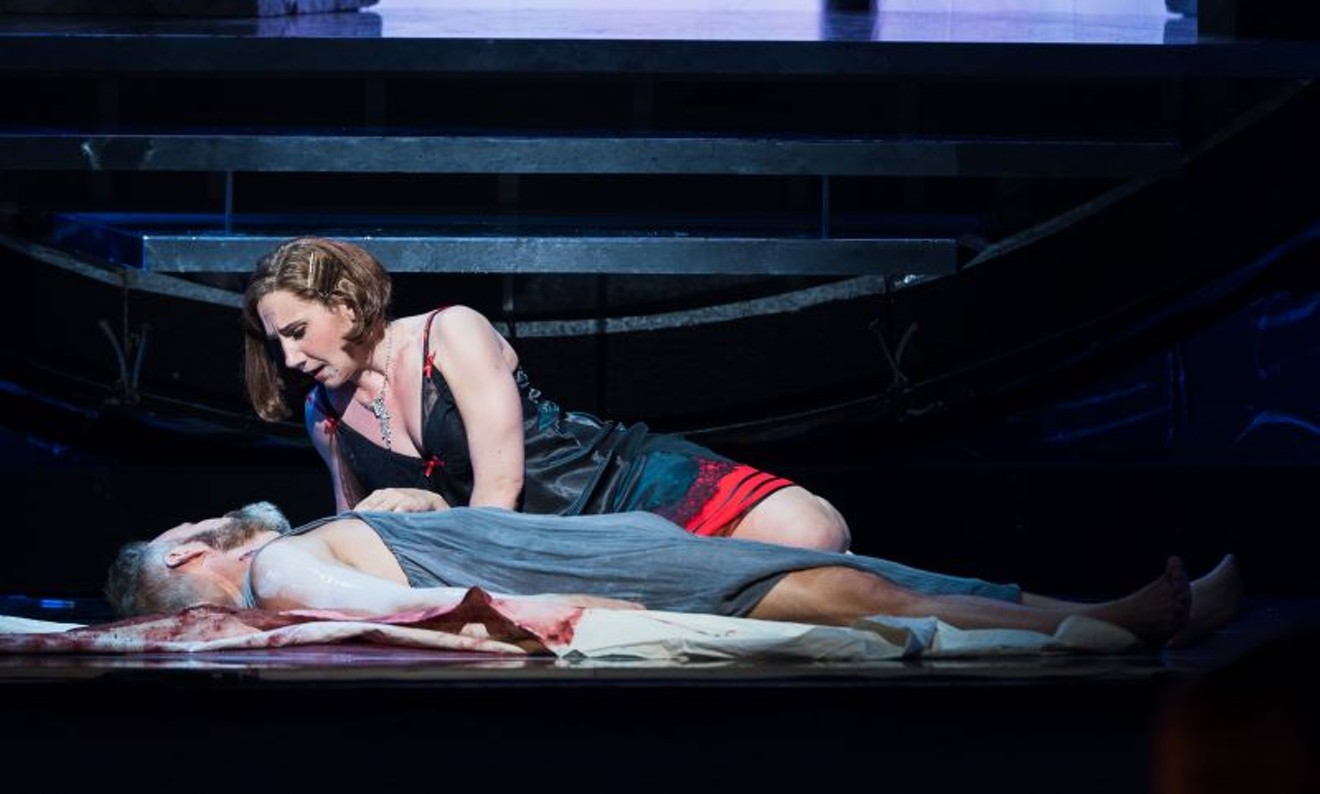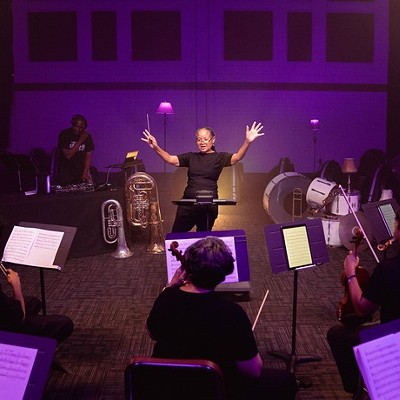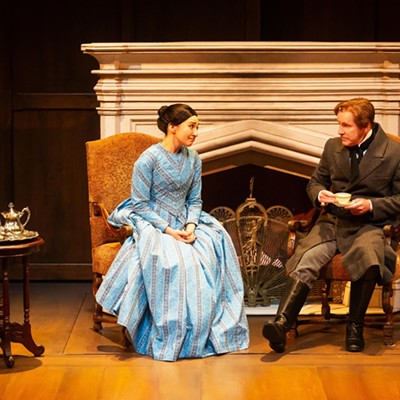Support Us
Houston's independent source of
local news and culture
account
- Welcome,
Insider - Login
- My Account
- My Newsletters
- Contribute
- Contact Us
- Sign out

Laura Wilde as Salome and Ryan McKinny as Jokanaa (John the Baptist) in Salome.
Photo by Michael Bishop
[
{
"name": "Related Stories / Support Us Combo",
"component": "11591218",
"insertPoint": "4",
"requiredCountToDisplay": "4"
},{
"name": "Air - Billboard - Inline Content",
"component": "11591214",
"insertPoint": "2/3",
"requiredCountToDisplay": "7"
},{
"name": "R1 - Beta - Mobile Only",
"component": "12287027",
"insertPoint": "8",
"requiredCountToDisplay": "8"
},{
"name": "Air - MediumRectangle - Inline Content - Mobile Display Size 2",
"component": "11591215",
"insertPoint": "12",
"requiredCountToDisplay": "12"
},{
"name": "Air - MediumRectangle - Inline Content - Mobile Display Size 2",
"component": "11591215",
"insertPoint": "4th",
"startingPoint": "16",
"requiredCountToDisplay": "12"
}
]
Abominable. Cacophonous. Cruelest discord. Disgusting. Madness.
Although these adjectives were used to describe the premiere of Richard Strauss' one-act opera masterpiece Salome (1905), adapted from Oscar Wilde's scandalous play, they could equally be applied to the current Houston Grand Opera production from Palau de les Arts Reine Sofia de Valencia.
Directed by Francisco Negrin, with set and costume design by Louis Désiré, and video projection by Joan Rodón, the ancient court of Herod Antipas teems with slinky prostitutes in fishnets and bustiers, five Jews in 19th century greatcoats and bowler hats, Nazi storm troopers, banana republic generals, devout peasants in what looks like couture sackcloth, and sleek bare-chested guys of indeterminate sex wearing high heels. There's a whole lot of debauchery going on.
There's also a projected lava lamp on steroids seen in the prison of John the Baptist (Jokanaan in the opera), whose psychedelic blobs distract mightily whenever someone stands in front of the annoying kaleidoscope. This is operatic Euro-trash of the highest order. It's still among us and refuses to die.
What's a disconsolate 16-year-old princess to do? Her stepfather lusts after her, she has no friends, and hates life at court. She praises the moon as chaste and pure as she is. The moon is another character in this work, always shimmering in the orchestra with high strings or clarinet wail. On the cusp of adulthood, there's no one to understand or comfort her. In an almost psychotic break, she falls hard for Prophet Jokanaan, imprisoned in a cistern for blaspheming against the lurid life of stepfather Herod and wife Herodias. Herod has killed his brother then married his widow. The Prophet is not pleased and condemns the couple in the harshest terms.
Mesmerized by this charismatic man from the desert, Salome rhapsodizes – his eyes like dark seas, his hair like black grapes, his body of ivory, and his mouth like scarlet or roar of trumpets. She repeats her fever dream, I want to kiss your mouth. Jokanaan curses her, scurrying away from her vile embrace. But she is hooked, and Jokanaan is her drug of choice.
When Herod promises her anything she desires if she will dance for him, she sees her chance. The famous orchestral excerpt Dance of the Seven Veils commences. But wait a minute, something goes horribly wrong. She doesn't dance a step, but removes her shoes while the pole dancers remove her flimsy gauze wrap. Then Herod films her with a mini hand-held video camera, with images projected on screens behind them. Herod pursues her! Suddenly, the video becomes home movies of a nubile girl with hula hoop and having her lips painted an artificial pink. As Herod becomes more aroused, Salome slinks away, crouching behind the sofa in defensive posture. Where's the vixen here? Salome becomes victim. At the climax of the hedonist score, Herod hurls Salome into another room where he rapes her. Oh, my. I have a few choice Biblical curses for this.
Anyway, bruised and abused, Salome demands the head of John the Baptist on a silver platter. Distraught at the consequences that will befall him if he kills this man of God, Herod offers Salome half of his kingdom, precious jewels, his zoo of rare peacocks, even the veil from the Great Temple, all radiantly rendered by Strauss in lush chromaticism that gleams and blinds. Salome is possessed, obsessed. She wants what she wants and will have no other. Herod relents and orders the beheading.
After a harrowing execution, carried out offstage with skittering thumps and pinched strings from the orchestra, Salome has her reward. In one of opera's greatest shocks, she gloats over her conquest. Her aria is glorious, musically on the verge of a nervous breakdown and sexual paroxysm. Unfortunately, she's not singing to a severed head, because the henchmen of Herod have dragged out his entire body with a red gash on his neck. Did the executioner botch his job?
Herod has had enough of her sickness and orders her death. Offstage, smoke rises from the turntable set with its hieroglyphic graffiti. With the tympani pounding – black out.
The mise en scene is a horror show, way too obvious in its depravity, a wan throwback to '80s naughty discotheques and leather dive bars. What saves this muddled HGO production is the magnificent conducting from Canadian maestro Keri-Lynn Wilson who is on intimate terms with Strauss' massively layered score. She paints with exquisite strokes, finding the gossamer brilliance that sweeps between and among the titanic orchestration. The clarity is striking, with crystalline woodwinds and blaring horns, and purring skittering strings. The passion is there in those solid C major passages for Jokanaan, and Strauss' inherent lyricism is wondrously handled throughout. If there's another Strauss on the horizon at the opera, let Wilson conduct it, please.
The other saving grace, naturally, is the sumptuous singing. No matter the questionable actions required by director Negrin, the singers rise above them as if angelic. Each and every one gives an indelible performance. In this era, could there be any better interpreters? Soprano Laura Wilde is superlative in this most demanding role. Dressed as a '20s flapper with Louise Brooks bob, she radiates youth and then morphs into psycho slut. Her silvery voice is lighter than the heavier type often heard in the title role, but it suits the character. She holds the stage with that voice, caressing Strauss' ripe vocal line and holding her own against his immense and thick orchestration. She's a revelation.
Could there be a more visually attractive Jokanaan than bass-baritone Ryan McKinny? Often miscast with a doughy older singer, here is a Prophet Salome could paw over. Solid and muscular, he's not the emaciated man of the desert who lives on wild honey and locusts in Mark's gospel, but who cares if there's a gym near the River Jordan, he's perfect in the role. And his voice is an instrument of awe and immense dignity. As if covered in ash and made to sit like a Buddha in a yoga class in his cistern prison, he commands indignant outrage as he booms out his pronouncements against the libidinous Herod family.
Tenor Chad Shelton is the epitome of sleaze as Herod, getting drunker as the Judean evening wears on before he gets cornered into agreeing to an impossible demand. His bright clear voice and excellent diction cuts through any of Strauss' myriad textures and creates a searing portrait of a man gone to seed. Legendary soprano Karita Matilla, who created quite a stir as Salome at the Metropolitan Opera in 2004 when she discarded all her seven veils and ended up completely nude, takes on the juicy secondary role of Herodias, the evil gorgon mother.
She prowls the stage in black velvet evening gown slit up to Westheimer with cascading blond hairdo á la Lauren Bacall. Later the wig will be removed by one of the prancing boys, revealing a shining bald pate. Nothing deters Matilla, one of the great ones. She's still got it. Her emotional and disquieting taunting of Herod and her insidious urging of her daughter's evil request are rapturously sung. She gets her character and runs with it.
The others in the cast shine also, especially tenor Eric Taylor as palace commander Narraboth, pining for one glance from Salome or perhaps a thrown flower as she passes. When he commits suicide at her brazen disregard and love of Jokanaan, his body is rolled stage left where it seems he is consumed by the courtiers. That's how it reads. What else could they be doing as they dig in?
Ah, yes, just another shocking night in trash heaven. But heaven is there at HGO – in the orchestra, the singers, and Strauss. Salome has always been on the top of my desert island operas. For this one, I'll take the CD and leave the DVD at home.
Salome continues through May 12 at 2 p.m. Sunday, April 30; 7:30 p.m. Saturday, May 6; 7:30 p.m. Wednesday, May 10; and 7:30 p.m. Friday, May 12 at the Wortham Theater, 501 Texas. Sung in German with projected English translations. For more information, call 713-228-6737 or visit houstongrandopera.org. $20-$210.
KEEP THE HOUSTON PRESS FREE...
Since we started the Houston Press, it has been defined as the free, independent voice of Houston, and we'd like to keep it that way. With local media under siege, it's more important than ever for us to rally support behind funding our local journalism. You can help by participating in our "I Support" program, allowing us to keep offering readers access to our incisive coverage of local news, food and culture with no paywalls.
D.L. Groover has contributed to countless reputable publications including the Houston Press since 2003. His theater criticism has earned him a national award from the Association of Alternative Newsmedia (AAN) as well as three statewide Lone Star Press Awards for the same. He's co-author of the irreverent appreciation, Skeletons from the Opera Closet (St. Martin's Press), now in its fourth printing.
Contact:
D. L. Groover
Trending Arts & Culture
- Bring a Friend With You to See A.D. Players' Heartwarming Production of Driving Miss Daisy.
- Best Bets: Latin Wave, California Gold and Philly Soul
- The 10 Best And Most Controversial Hustler Magazine Covers Ever (NSFW)
-
Sponsored Content From: [%sponsoredBy%]
[%title%]

Don't Miss Out
SIGN UP for the latest
arts & culture
news, free stuff and more!
Become a member to support the independent voice of Houston
and help keep the future of the Houston Press FREE
Use of this website constitutes acceptance of our
terms of use,
our cookies policy, and our
privacy policy
The Houston Press may earn a portion of sales from products & services purchased through links on our site from our
affiliate partners.
©2024
Houston Press, LP. All rights reserved.





